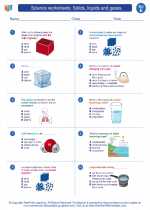Factors Affecting Strength
There are several factors that can affect the strength of a material:- Material Composition: Different materials have different inherent strengths. For example, metals tend to have high strength compared to plastics.
- Crystal Structure: The arrangement of atoms in a material can affect its strength. Materials with a regular and ordered crystal structure tend to be stronger.
- Temperature: High temperatures can weaken some materials, while others may become stronger at elevated temperatures.
- Processing: The way a material is processed, such as through heat treatment or alloying, can significantly impact its strength.
- Microstructure: The size, shape, and distribution of microscopic features in a material can influence its strength.
Types of Strength
Strength can be categorized into several types:- Tensile Strength: The ability of a material to withstand a stretching force without breaking.
- Compressive Strength: The ability of a material to withstand a squeezing or crushing force.
- Shear Strength: The ability of a material to withstand forces that cause parts of the material to slide past each other in parallel planes.
- Yield Strength: The point at which a material begins to deform plastically under a applied force.
- Ultimate Strength: The maximum stress a material can withstand before it fractures.
Applications of Strength
Understanding the strength of materials is crucial in various applications, including:- Designing and constructing buildings, bridges, and other structures
- Developing new materials for use in industries such as aerospace, automotive, and manufacturing
- Ensuring the safety and reliability of mechanical components
Study Guide
To study the topic of strength, consider the following key points:- Learn about the different types of strength and their definitions.
- Explore the factors that influence the strength of materials and how they apply to real-world examples.
- Understand the significance of strength in various industries and everyday life.
- Conduct experiments or research projects to investigate the strength of different materials under various conditions.
- Review case studies of material failures or successes related to strength.
◂Science Worksheets and Study Guides Fifth Grade. Science worksheets: Solids, liquids and gases.
Study Guide Solids, liquids and gases
Solids, liquids and gases  Worksheet/Answer key
Worksheet/Answer key Solids, liquids and gases
Solids, liquids and gases  Worksheet/Answer key
Worksheet/Answer key Solids, liquids and gases
Solids, liquids and gases  Worksheet/Answer key
Worksheet/Answer key Solids, liquids and gases
Solids, liquids and gases  Vocabulary/Answer key
Vocabulary/Answer key Solids, liquids and gases
Solids, liquids and gases 

 Worksheet/Answer key
Worksheet/Answer key
 Worksheet/Answer key
Worksheet/Answer key
 Worksheet/Answer key
Worksheet/Answer key
 Vocabulary/Answer key
Vocabulary/Answer key

The resources above cover the following skills:
PHYSICAL SCIENCE (NGSS)
Matter and Its Interactions
Students who demonstrate understanding can:
Make observations and measurements to identify materials based on their properties.